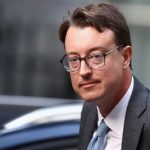Rishi Sunak is to prioritise the interests of millions of car owners with a series of measures that will provoke environmentalists and curb the power of local councils.
In a package expected to be announced at the Tory conference on Monday, the prime minister will set out his “plan for motorists” that will limit the number of 20mph speed restrictions and favour drivers over bus passengers.
The move would be hugely controversial, setting ministers on a collision course with local authorities, who rely on their powers to keep bus lanes traffic free.
Sunak’s plan is the latest in a recent series of contentious policy ideas, such as his watering down of net zero targets, designed to revive his government and create clear dividing lines with Labour.
He has also raised the prospect of paring back the hugely over-budget HS2 rail line – though he refused to provide clarity on his plans on Thursday.
In the marathon media round during which Sunak carried out 34 separate interviews with local BBC and ITV outlets, the prime minister was repeatedly pinned down over the Birmingham to Manchester leg of the HS2 rail link, refusing to commit to it on more than a dozen occasions.
The “plan for motorists” is expected to include moves to limit English councils’ powers to place 20mph speed limits on main roads, and to restrict the number of hours a day that car traffic is banned from bus lanes.
It is also understood to include curbs on local authorities’ ability to impose fines – and thus raise revenue – from traffic infractions caught by automatic number plate recognition cameras, and on the use of such cameras in box junctions.
Sunak is also expected to cite concerns about so-called 15-minute cities, an urban planning concept based around having shops and workplaces near homes, which some protesters claim is a UN-led conspiracy to limit people’s ability to travel.
A Department for Transport source described the policies as “speculation”.
The proposals follow Sunak’s pledge in July to crack down on what he called “anti-motorist policies” after the unexpected Conservative win in the Uxbridge and South Ruislip byelection, which was aided by concerns about the expansion of London’s ultra-low emission zone (Ulez).
At the time, Downing Street said Sunak had no plans to restrict the use of 20mph speed limits, which evidence shows can significantly reduce the numbers of road deaths and injuries.
Clean air ‘a right not a privilege’, says London mayor as Ulez is expandedRead more
The plans, which have not been discussed with councils, are likely to prompt pushback against what appears to be a further centralisation of powers, as well as concerns that a policy to promote car use at the expense of other modes goes against recent decades of policy in many other countries.
In July, the prime minister ordered a review of low-traffic neighbourhoods (LTNs), which seek to increase active travel by restricting through traffic on smaller residential streets.
Councils in England have since been instructed by the DfT to return lengthy questionnaires by the end of September on any LTNs they have installed since 2020, including the consultation process used before they were built.
In one of his interviews, talking to BBC Radio Manchester, Sunak pushed back against questions over HS2 by appearing to argue that pro-driver policies were more important, given “the vast majority of the journeys that people make are in their cars”.
In a later interview, with ITV’s Granada region – also based in Manchester – Sunak appeared to hint that he might try to assuage anger about a cancellation of the Birmingham-to-Manchester HS2 leg by announcing other rail projects in the north of England.
Asked why he could not be open with people in the region about HS2, Sunak replied: “Actually, when I’m out and about, people when they talk to me are much more focused on the journey times between all our northern towns.”
In an apparent nod to the announcement on Monday, Sunak also told the interviewer that as well as rail, he was “making sure we focus on the transport that people use every day – people are out and about in their cars, they want their potholes filled”.
The prospect of limiting councils’ powers to improve road conditions for bus users, as well as cyclists and pedestrians, could provoke another controversy, especially in Manchester, where buses have just been brought back under public control.
The transport charity Sustrans said the “plan for motorists”, if introduced, would mean Sunak was yet again failing those people who did not drive or own a car.
A spokesperson said: “Why is the prime minister going out of his way to clog our roads with cars – what kind of legacy is this supposed to leave? What about the 45% of people on low incomes who don’t own a car?
“Prioritising cars in this way serves no one – not pedestrians, not cyclists, not users of public transport. It doesn’t even benefit drivers, who will face more congestion.”
Sarah Mitchell, the chief executive of the charity Cycling UK, said: “When Beeching took an axe to local railways in the 1960s, we were robbed of the freedom to choose how we travel. The government’s reported ‘plan for the motorist’ feels like history repeating itself.
“We need a holistic plan for how people can travel, not a plan that zooms in on one particular mode of transport. A plan that gives us the freedom to choose how we travel, maximising our ability to opt for healthy, cheap and convenient options.
“Better public transport, and safer ways for people to cycle and walk are entirely compatible with driving. Focusing on one way of travelling is like trying to complete a jigsaw with half the pieces missing.”



